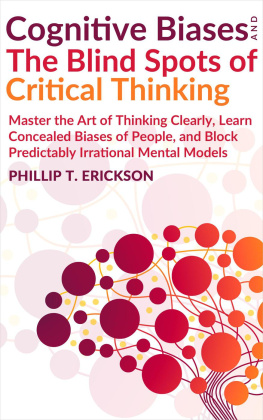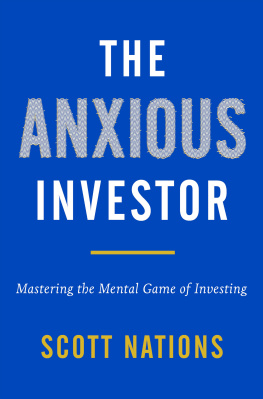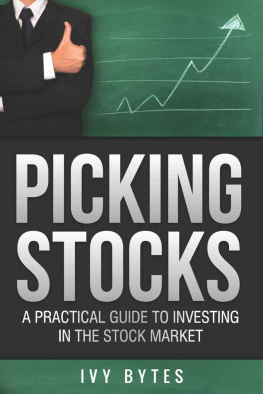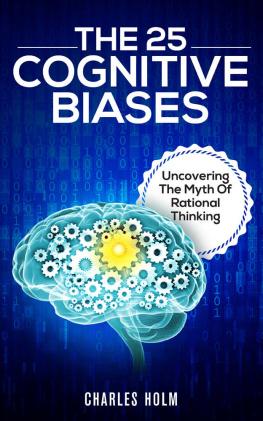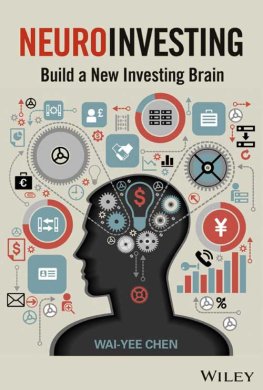INVESTING and the IRRATIONAL MIND
INVESTING and the IRRATIONAL MIND
Rethink Risk, Outwit Optimism, and Seize Opportunities Others Miss
ROBERT KOPPEL


Copyright 2011 by Robert Koppel. All rights reserved. Except as permitted under the United States Copyright Act of 1976, no part of this publication may be reproduced or distributed in any form or by any means, or stored in a database or retrieval system, without the prior written permission of the publisher.
ISBN: 978-0-07-175343-2
MHID: 0-07-175343-5
The material in this eBook also appears in the print version of this title: ISBN: 978-0-07-175337-1, MHID: 0-07-175337-0.
All trademarks are trademarks of their respective owners. Rather than put a trademark symbol after every occurrence of a trademarked name, we use names in an editorial fashion only, and to the benefit of the trademark owner, with no intention of infringement of the trademark. Where such designations appear in this book, they have been printed with initial caps.
McGraw-Hill eBooks are available at special quantity discounts to use as premiums and sales promotions, or for use in corporate training programs. To contact a representative please e-mail us at bulksales@mcgraw-hill.com.
This publication is designed to provide accurate and authoritative information in regard to the subject matter covered. It is sold with the understanding that neither the author nor the publisher is engaged in rendering legal, accounting, securities trading, or other professional services. If legal advice or other expert assistance is required, the services of a competent professional person should be sought.
From a Declaration of Principles Jointly Adopted by a Committee of the American Bar Association and a Committee of Publishers and Associations
TERMS OF USE
This is a copyrighted work and The McGraw-Hill Companies, Inc. (McGraw-Hill) and its licensors reserve all rights in and to the work. Use of this work is subject to these terms. Except as permitted under the Copyright Act of 1976 and the right to store and retrieve one copy of the work, you may not decompile, disassemble, reverse engineer, reproduce, modify, create derivative works based upon, transmit, distribute, disseminate, sell, publish or sublicense the work or any part of it without McGraw-Hills prior consent. You may use the work for your own noncommercial and personal use; any other use of the work is strictly prohibited. Your right to use the work may be terminated if you fail to comply with these terms.
THE WORK IS PROVIDED AS IS. McGRAW-HILL AND ITS LICENSORS MAKE NO GUARANTEES OR WARRANTIES AS TO THE ACCURACY, ADEQUACY OR COMPLETENESS OF OR RESULTS TO BE OBTAINED FROM USING THE WORK, INCLUDING ANY INFORMATION THAT CAN BE ACCESSED THROUGH THE WORK VIA HYPERLINK OR OTHERWISE, AND EXPRESSLY DISCLAIM ANY WARRANTY, EXPRESS OR IMPLIED, INCLUDING BUT NOT LIMITED TO IMPLIED WARRANTIES OF MERCHANTABILITY OR FITNESS FOR A PARTICULAR PURPOSE. McGraw-Hill and its licensors do not warrant or guarantee that the functions contained in the work will meet your requirements or that its operation will be uninterrupted or error free. Neither McGraw-Hill nor its licensors shall be liable to you or anyone else for any inaccuracy, error or omission, regardless of cause, in the work or for any damages resulting there from. McGraw-Hill has no responsibility for the content of any information accessed through the work. Under no circumstances shall McGraw-Hill and/or its licensors be liable for any indirect, incidental, special, punitive, consequential or similar damages that result from the use of or inability to use the work, even if any of them has been advised of the possibility of such damages. This limitation of liability shall apply to any claim or cause whatsoever whether such claim or cause arises in contract, tort or otherwise.
Contents
Foreword
WILLIAM J. BRODSKY
Chairman and CEO, Chicago Board Options Exchange
Over the years of helping to guide the development of several U.S. exchangescurrently as chairman and CEO of the Chicago Board Options Exchange, and before that at the Chicago Mercantile Exchange and the American Stock ExchangeIve had the pleasure of getting to know a long list of professional traders and investors. In addition, I am an avid personal investor.
Many of the professionals I knowseveral of whom are profiled in this bookhave become legends for their trading prowess. Their successes, however, rather than being a series of endless profitable trades, were peppered along the way with some failures, followed by a good dose of learning and personal introspection. Otherssome professional traders and many more who are part-time investorshave not been as successful; they have had to learn the hard way that without emotional intelligence, even the best-thought-out strategy can unravel during times of market upheaval. John Maynard Keynes admonished that the markets have the ability to stay irrational longer than investors can stay solvent, and for those who are unable to digest that warning, the journey toward becoming a successful investor or trader may be short-lived.
This book also suggests that neither formal education nor raw IQ appears to be the biggest factor in achieving market success. In his inimitable down-to-earth style, Warren Buffett may have said it best: Investing is not a game where the guy with the 160 IQ beats the guy with a 130 IQ. Whats needed is a sound intellectual framework for making decisions and the ability to keep emotions from corroding that framework.
And that, in its broadest sense, is what Bob Koppels book explores. Contained in its 250 fast-reading pages are fascinating examples and insights into how the brain works, drawn from studies of some of the best scientific minds in behavioral economics and psychology.
This book differentiates itself from others that concentrate on either nuts-and-bolts analytical and strategic skills (the stuff of the left brain) or simple formulas for market mastery. Taking an entirely different path, our author and the experts he cites suggest that investors emotions cannot and should not be ignored, with all market decisions being left to automated trading systems. Instead, the underlying theme is that the best investors are able to recognize their emotions and use them to their advantage without allowing those emotions to overpower them.
In his introduction, Koppel states that he has come to believe that the market is truly a Rorschach testa way to see himself clearly in the mirror, with all of his personal beliefs, emotions, and inconsistencies in how he deals with the markets laid out before him. He is able to expertly express why these human factors may be inextricably linked to a better chance of success in the markets.
The good news, as Bob points out, is that even old dogs can learn new tricks about investing. We can master new skills, alter old ones, overcome crippling emotions, and, through experimentation, teach ourselves psychological responses and styles that can become automatic. And we can do this because, as the latest findings on the plasticity of the brain prove, we continue to change.
Readers of this book will find within these pages new truthsin the form of a sort of investors field manualthat will help transform their thinking on an important subject. I believe that this is as relevant as, or more so than, todays latest investment strategies, trading systems, or technical chart formations. It is yet another successful endeavor for Bob, whose books offer lessons that could be extremely invaluable throughout ones investing life.
Next page


